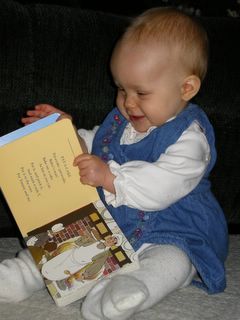
D1 enjoys a twaddle-free board book.
Over the past week I've been reading and re-reading A Charlotte Mason Companion. I am really, really excited about this approach to education, despite the Victorian woodcut illustrations and frequent use of words like "gentle," neither of which is really my cup of tea. I confess I have yet to get my hands on a copy of Charlotte Mason's original works, but maybe I can get my sisters to make me a long-term loan from their resource library.
Educating my children has to reflect what I believe to be true about them as people. And they are people, just like me, only quite a bit shorter still. They are made in God's image, made to be curious, inventive, creative, analytical. But they are also fallen, born sinners. Thus, I want an educational approach that treats them as image-bearers of God, empowering them to be the primary actors in their education; and yet that acknowledges their fallen nature, realizing they still need guidance and training.
I used to say (I've been analyzing homeschooling theories since I was ten) my two favorite homeschooling methods were Classical and Unschooling, and I didn't see how I could reconcile the two. But the Charlotte Mason method seems to offer what I see as the best of both: the child is deliberately introduced to the greatest ideas of all time, and trained in good habits of application; yet at the same time, the child is teaching himself, lessons don't dominate the day, and success is measured by the child's enjoyment and personal relationship with the subjects, not 85% correct on a test.
Best of all, the core concepts of the Charlotte Mason approach are simply the things we would do every day anyway. Yes, even at nine months:
Living books: Children should be given only excellent books in every subject and at every age. There's no "twaddle" allowed at this house—talking down to children, or dumbing things down for them. My test is simple: if I won't enjoy reading a book over and over, we don't get it. D1 has just started to enjoy turning the pages of books even more than chewing on them, and shows a special fondness for listening to poetry. At least Mother Goose and Dr. Seuss. She wasn't that interested in Chesterton, but I'll have to try again.
Narration: This takes the place of nearly all worksheets and tests—the child simply tells back what they have learned. The point is for them to interact personally with the book or experience. D1 is not, of course, able to narrate yet, but we model it for her: "Shall we tell Papa what we did today? Aunt Kristen came and we helped fold the laundry."
Nature study: The child develops good habits as well as good health by spending ample time outside, and sometimes recording what he observes. D1 and I have taken a walk every decent day since she was a couple of weeks old. When we see a bird or a squirrel or new flowers in someone's yard, we stop to take a look at them and talk about them. Later this summer I will probably get myself a notebook to record things that catch her eye.
Building habits: I want my children to learn for the joy of learning, but I also know they need to develop good habits to get them over the rough parts, especially once they begin training for a career. More on this in a later post.
Everybody has different needs, of course, and I'm sure we will change things over time as we start turning theory into practice. But this seems like a perfect fit for us. DOB and I, over the weekend, even drew up a basic outline of how we want to arrange our studies, using a four-year study of history (DOB's favorite subject) as the basic structure, and organizing our other studies around that. It's going to be hard to wait the next four and a half years until we can get started.
No comments:
Post a Comment